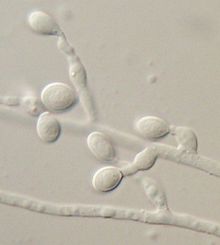Scedosporium
Jump to navigation
Jump to search
This article relies largely or entirely on a single source. (October 2022) |
| Scedosporium | |
|---|---|

| |
| Photomicrograph of Scedosporium prolificans colony growing on Modified Leonian's agar | |
| Scientific classification | |
| Kingdom: | |
| Division: | |
| Class: | |
| Order: | |
| Family: | |
| Genus: | Scedosporium
|
Scedosporium is a genus of fungi in the family Microascaceae.
The genus shed the alternative name Pseudallescheria as the "One Fungus, One Name" principle overtook the previous dual naming system, which had a distinct name for the anamorph and teleomorph.[1]
Species and species complexes
The following are based on Ramirez-Garcia et al., 2018[1]
- Scedosporium apiospermum Species complex
- Scedosporium prolificans
- Scedosporium aurantiacum
- Scedosporium minutisporum
- Scedosporium desertorum
- Scedosporium cereisporum
- Scedosporium dehoogii Species complex
See also
References
- ^ a b
Ramirez-Garcia, Andoni; Pellon, Aize; Rementeria, Aitor; Buldain, Idoia; Barreto-Bergter, Eliana; Rollin-Pinheiro, Rodrigo; de Meirelles, Jardel Vieira; Xisto, Mariana Ingrid D S; Ranque, Stephane; Havlicek, Vladimir; Vandeputte, Patrick; Govic, Yohann Le; Bouchara, Jean-Philippe; Giraud, Sandrine; Chen, Sharon; Rainer, Johannes; Alastruey-Izquierdo, Ana; Martin-Gomez, Maria Teresa; López-Soria, Leyre M; Peman, Javier; Schwarz, Carsten; Bernhardt, Anne; Tintelnot, Kathrin; Capilla, Javier; Martin-Vicente, Adela; Cano-Lira, Jose; Nagl, Markus; Lackner, Michaela; Irinyi, Laszlo; Meyer, Wieland; de Hoog, Sybren; Hernando, Fernando L (2018). "Scedosporium and Lomentospora: an updated overview of underrated opportunists". Medical Mycology. 56 (suppl_1): S102–S125. doi:10.1093/mmy/myx113. hdl:10810/65704. ISSN 1369-3786. PMID 29538735.
Abstract: Species of Scedosporium and Lomentospora are considered as emerging opportunists, affecting immunosuppressed and otherwise debilitated patients, although classically they are known from causing trauma-associated infections in healthy individuals. Clinical manifestations range from local infection to pulmonary colonization and severe invasive disease, in which mortality rates may be over 80%. These unacceptably high rates are due to the clinical status of patients, diagnostic difficulties, and to intrinsic antifungal resistance of these fungi. In consequence, several consortia have been founded to increase research efforts on these orphan fungi. The current review presents recent findings and summarizes the most relevant points, including the Scedosporium/Lomentospora taxonomy, environmental distribution, epidemiology, pathology, virulence factors, immunology, diagnostic methods, and therapeutic strategies.